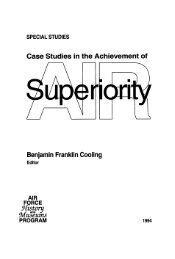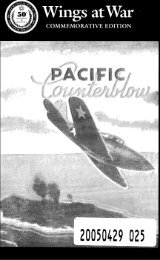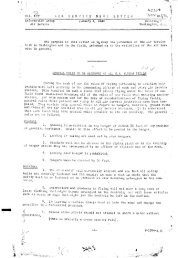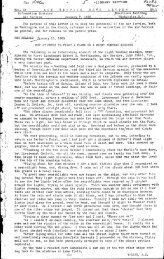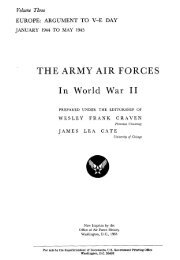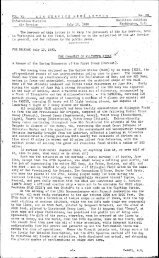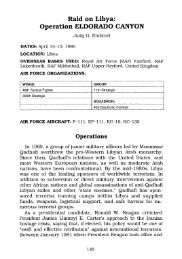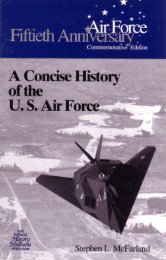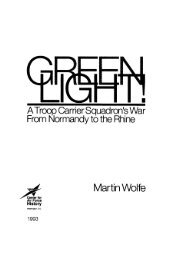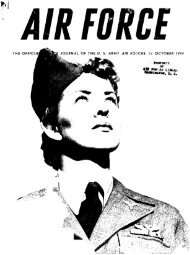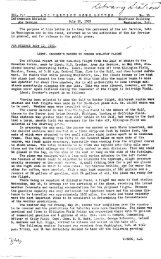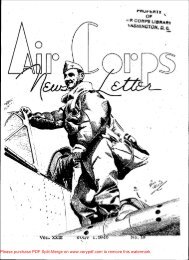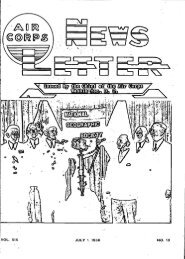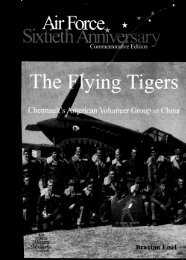News Letter 1941 Jul-Dec - Air Force Historical Studies Office
News Letter 1941 Jul-Dec - Air Force Historical Studies Office
News Letter 1941 Jul-Dec - Air Force Historical Studies Office
You also want an ePaper? Increase the reach of your titles
YUMPU automatically turns print PDFs into web optimized ePapers that Google loves.
Our New Bases<br />
AsslgDlDent to Newfoundland<br />
By Lieut. John' e, A. Watkins<br />
Newfoundland is a grim, rugged island and duty<br />
with one of the <strong>Air</strong> <strong>Force</strong> Comeat Command units<br />
stationed at such places as the Newfoundland <strong>Air</strong><br />
Base--on the great transatlantic Newfoundland <strong>Air</strong>port<br />
in the interior of the island--is certain to<br />
entail some hardships.<br />
On the other.hand, service there will be unlike<br />
duty almost anywhere else within the scope of<br />
American operations, with some attractions and<br />
considerable interest. The hunting and fishing is<br />
excellent, for salmon and such big game as caribou<br />
and polar bears. Some of the most famous people<br />
in the world p~ss through the Newfoundland <strong>Air</strong><br />
Base, ~ their way to England by air or coming to<br />
this country over the same route, and the officers<br />
stationed at the base come in close contact with<br />
them.<br />
The Newfoundland <strong>Air</strong> Base is about 250 miles<br />
northwest of St. Johns, capital and largest city<br />
of Newfoundland. On the shores of long, deep<br />
Gander Lake, which never freezes, the Newfoundland<br />
<strong>Air</strong>port has been widely publicized not only for its<br />
isolation and almost complete inaccessibility by<br />
every means of transportation but air, but also<br />
for its astonishingly huge macadam runways.<br />
The atmosphere of the base is grim, probably<br />
more so than at any other military air field on<br />
which American troops are stationed. One side of<br />
the great runways, where Canadian troops live and<br />
work, very definitely is at war. The other side<br />
is occupied by the American forces; each force has<br />
its own installations and manages its own affairs,<br />
although there is cooperation between the two.<br />
All the buildings, from barracks to hangars, are<br />
provided by the Canadian Government and are erected<br />
under that Government's supervis ion. Consequentl~<br />
the structures housing American troops are<br />
identical with those housing the Royal Canadian<br />
<strong>Air</strong> <strong>Force</strong> and Canadian army units on the field,<br />
and are of standard Canadian, rather than United<br />
States Army, construction and design. The barracks<br />
are well-built and attractive on the outside, more<br />
so than our own, Most of them are one story, with<br />
shingled outside walls. Naturally they are more<br />
carefully protected against the weather than buildings<br />
in warmer climates.<br />
Inside, ,the barracks for enlisted men are about<br />
the same as any standard sleeping quarters for<br />
troops. So are those for officers, the general<br />
rule being that two officers share one small room.<br />
5<br />
These rooms have hardwood floors, but no closets.<br />
A small shelf is provided on either side of the<br />
door, but any additional storage space that is required<br />
is built by the officers themselves from<br />
old packing cases. A few straight-backed chairs<br />
and tables are available, but the transportation<br />
problem is difficult and there is certain always<br />
to be a lack of furniture. Unmarried officers pay<br />
their rental allowance for their quarters; married<br />
ones do not.<br />
Hangars and living quarters for the American and<br />
Canadian forces are being augmented by a large<br />
force of native Newfoundlanders, who live and eat<br />
in barracks provided for the labor gangs. These<br />
men are paid good wages and are allowed to work as<br />
long as they want. Many, apparently wishing to<br />
make enough money to last them through the next<br />
few long Newfoundland winters, are working almost<br />
around the clock. Trucks rumble by the harracks<br />
all night long, and frequently a lone Newfoundlander<br />
may be seen digging away in a ditch all by<br />
himself at four or five o'clock in the morning.<br />
Visitors to the Newfoundland <strong>Air</strong> Base get an impression<br />
of isolation more complete than on a<br />
South Pacific island. The entire country is covered<br />
by thousands of ponds and lakes, interspersed<br />
with miles of a thick, tangled and virtually impenetrable<br />
mass of scrub spruce, birch and underbrush.<br />
Almost all of the island is a morass, and<br />
everywhere the sunlight glints on water beneath<br />
the thick green mat of vegetation as your airplane<br />
flies overhead. It seems that it would be almost<br />
impossible to walk anywhere, except along the coasts<br />
or in the rocky hi ghlands, and if a pilot encounters<br />
engine trouble, he would do well to land ~eels up<br />
along the shore line of a lake sufficiently big to<br />
permit a rescuing amphibian to land and take off<br />
again.<br />
Practically the entire population, limited enough<br />
as it is, is concentrated along the coasts, and<br />
there are few cOlllllUni ties of more than two .or three<br />
houses in the interior. A Royal <strong>Air</strong> <strong>Force</strong> officer<br />
and the writer rode in the bombardier's position<br />
in the nose of a B-18 clear across the island, to<br />
the west coa~t, with the agreement that the first<br />
to sight a house, a man or a boat would be paid $1<br />
by the other. In nearly two hours of flying, at<br />
only a few thousand feet in perfectly fine weather,<br />
neither of us even imagined that we had sighted<br />
anything resembling a house, a man or a boat.



